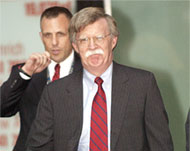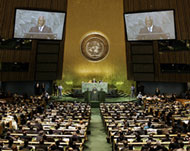Asia’s claim to top UN job challenged
As the race to succeed Kofi Annan, the UN chief, gets under way, an informal tradition makes it an Asian’s turn to take the job. But the US and Britain say the best candidate should be selected regardless of nationality.

Asian candidates for the post of top world diplomat, which Annan will leave on 31 December after two five-year terms, have started making the rounds in Washington, which has made it clear it is not committed to the regional rotation tradition.
Since 1946, three secretaries-general have been Europeans, two have come from Africa and one from Latin America. The sole Asian was U Thant of Burma, now called Myanmar, who served from 1961 to 1971 and Asia argues it now its turn.
“We ourselves are not asking for affirmative action for Asia,” said candidate Jayantha Dhanapala, adviser to the president of Sri Lanka and a former UN undersecretary-general for disarmament.
“But there has been a tradition of rotation – this is why there is a widespread consensus internationally that the next secretary-general should come from Asia,” he said in Washington last week.
Asian probables
Other Asians who have expressed interest in the job are Ban Ki-moon, the South Korean foreign minister, who will visit New York and Washington next week, and Surakiart Sathirathai, the deputy prime minister of Thailand.
A Thai newspaper reported last month that Bangkok’s outgoing ambassador to the US had sent home a cable in September urging the government to drop its campaign for Surakiart because it lacked support from Washington.
 |
|
Bolton says the next UN chief |
At the UN, US Ambassador John Bolton said: “We don’t believe that the next secretary-general belongs to any particular region.
Emyr Jones Parry, Britain’s UN ambassador, agreed, saying: “We are looking for the best person capable of meeting the demands of the job.”
In a description echoed by US allies Britain and Japan, a US official said in a recent interview that Washington sought a “strong manager who’s comfortable making tough decisions” after the mismanagement of the oil-for-food programme for Iraq.
Support for democracy and human rights were also key attributes, the US diplomat said.
If past elections are any guide, the 15-nation Security Council, which recommends a candidate to the 191-member General Assembly, will wait as long as it can to make a decision.
Final choice
Bolton would like one by July, although this is highly unlikely.
In practice, the five permanent council members – the US, Britain, France, Russia and China – have veto power and thereby make the final choice.
But they often blackball one another’s candidate and see who is left standing.
 |
|
Africa has supported the idea of |
On Thursday, Kong Quan, a Chinese Foreign Ministry spokesman, confirmed Beijing’s support for an Asian candidate.
At a meeting in Jakarta, Indonesia, in April, foreign ministers from Asia and Africa supported the candidacy of a Asian UN secretary-general.
Indonesian analyst Hariyadi Wirawan said that while the regional rotation idea has no constitutional basis, Asia had a strong claim as the world’s most populous region with many dynamic, fast-growing economies.
“The US is doing this alone and has emboldened Asia to fight this move,” he said. “The US will become more unpopular and this move will eventually be ineffective.”